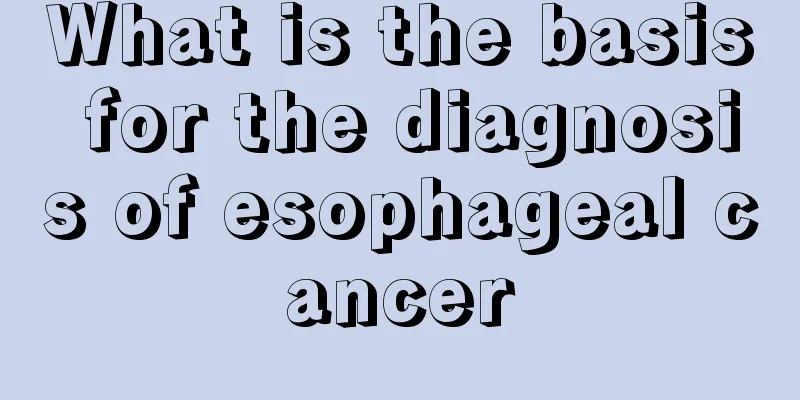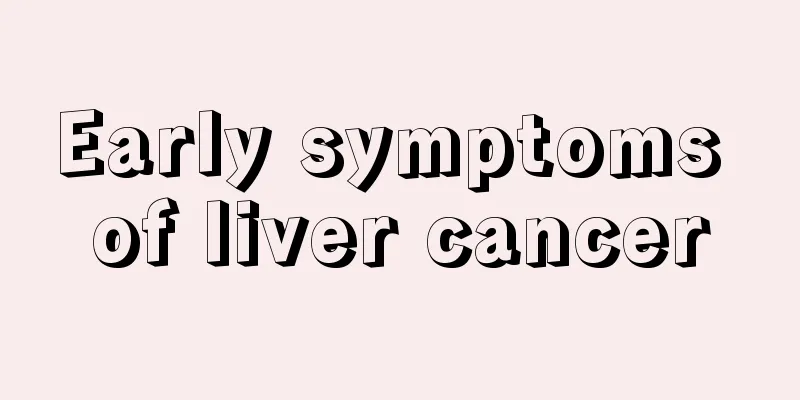What is the basis for the diagnosis of esophageal cancer

|
What is the basis for the diagnosis of esophageal cancer? I believe everyone is familiar with esophageal cancer. The incidence of this disease is very high. With the acceleration of the pace of life, it is getting younger and younger. In order to ensure good health, we should do a good job of prevention and diagnosis in life. So, do you know what is the basis for the diagnosis of esophageal cancer? One of the common methods for diagnosing esophageal cancer is medical examination. When you go to the hospital for treatment, the doctor will first perform an esophageal examination on the patient. Early esophageal cancer can be seen as local mucosal image interruption and weakened peristalsis. When the tumor grows into the lumen, the lumen can be narrowed, the esophageal edge is irregular or has filling defects. When the tumor fills the esophageal lumen, it causes lumen obstruction, the upper part expands, and food accumulates. Fiberoptic esophagoscopy or gastroscopy is a feasible method to check for esophageal cancer. The scope is thin and soft, easy to insert into the esophagus, and painless for the patient. The esophageal cancer can be directly seen under the scope, and tissue can be clamped for pathological examination. If there is any doubt, repeated examinations and cell biopsies can be taken to confirm the diagnosis. In addition, a balloon with a net is swallowed into the esophagus for esophageal cytology examination to check for cancer cells. Cancer cells can be found in 90% of esophageal cancer patients. Disease symptoms are also a common method for diagnosing esophageal cancer, including: 1. The most common symptom is swallowing obstruction, which can disappear or recur on its own and does not affect eating. It often occurs when the patient is emotionally unstable, so it is easily mistaken for a functional symptom. 2. Food retention infection and foreign body sensation When swallowing food or drinking water, there is a feeling of food moving slowly and being retained, as well as a feeling of tightness behind the sternum or food sticking to the esophageal wall, which disappears after eating. The site of symptom occurrence is often consistent with the site of lesions in the esophagus. 3. Pain behind the sternum and under the xiphoid process is more common. Pain behind the sternum or under the xiphoid process occurs when swallowing food. The pain may be burning, pricking or pulling, especially when swallowing rough, hot or irritating food. The pain is intermittent at first, but when the tumor invades nearby tissues or penetrates, there may be severe and continuous pain. The pain site is often not completely consistent with the lesion site in the esophagus. The pain can often be temporarily relieved by spasmolytics. Warm Tips: Through the above introduction, I believe you have some understanding of the diagnosis method of esophageal cancer. If you still have any questions, you can go to a relevant large hospital and ask a relevant doctor. In this way, patients can fully understand esophageal cancer. |
<<: Is it necessary to do esophageal endoscopy to diagnose esophageal cancer?
>>: How to diagnose esophageal cancer?
Recommend
How to get rid of bugs in the room in summer
If you have black bugs in your house, check your ...
How to make ice cream with milk powder?
In the hot summer, thirst-quenching cold foods ar...
What are the characteristics of small cell lung cancer
What are the characteristics of small cell lung c...
Can glioma be cured?
Glioma is a common disease nowadays. Because it h...
How long can a patient with liver metastasis of gallbladder cancer live after surgery
Gallbladder cancer is one of the common malignant...
What are the toxic chemical liquids
In our daily lives, if we come into contact with ...
Is it okay to drink honey after eating leeks
In fact, leeks and honey are two foods that are n...
Why does a non-stick pan stick
With the improvement of modern material standards...
How to diagnose pituitary tumors
Pituitary tumors do not have any obvious symptoms...
The symptoms of colorectal cancer can develop from early stage to late stage
The symptoms of colorectal cancer can develop fro...
What kind of moles should be removed
Most moles are benign, and many people in life do...
Is thyroid cancer dangerous or not? Is it serious?
Thyroid cancer is caused by a malignant tumor of ...
Are prolactinomas serious?
Prolactinoma is certainly a serious problem becau...
How long does it usually take for hepatitis E to heal itself
Hepatitis E is a type of liver disease. It is a c...









